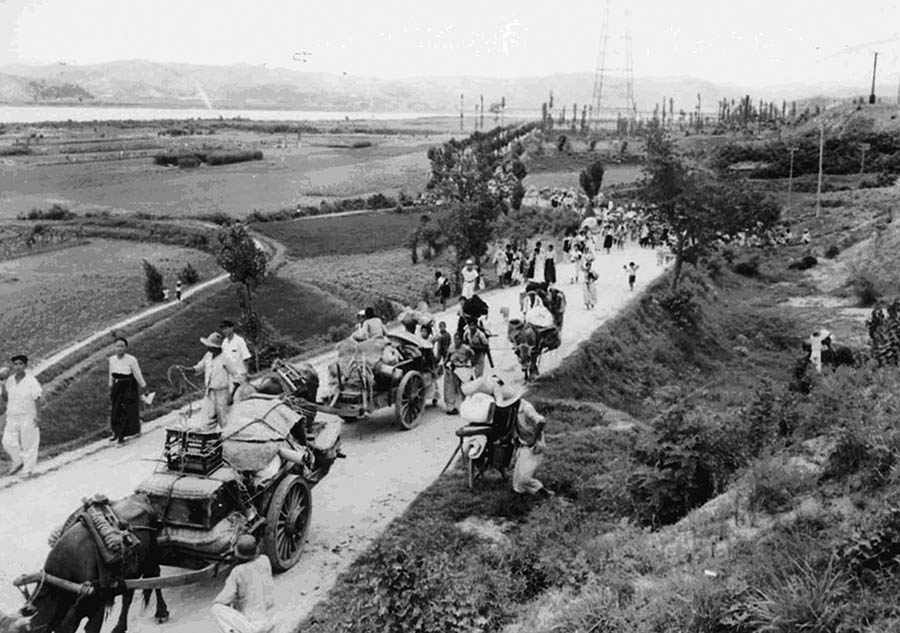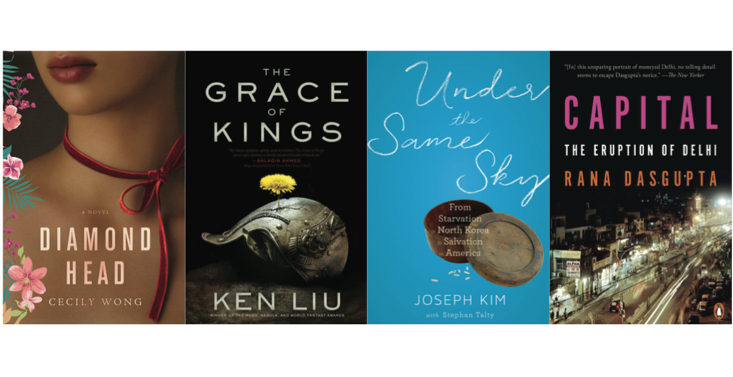This article was published in the June 2000 issue of KoreAm Journal by then-assistant editor (and current contributing editor), Jimmy Lee. Some portions of the article have been edited for relevance and to include additional information.
by JIMMY LEE
In high school U.S. history class, it was the war that broke out in Korea on June 25, 1950—after World War II and before Vietnam. There weren’t any deeper examinations into the subject after that. But the Korean War is not even officially over, yet it’s regarded as the “Forgotten War.”
As for me, a 1.5-generation Korean American, the history of the Korean War held no interest compared to my thirst for soaking up all things American.
But as we put this issue together, it struck me for the first time that the Korean War is not so distant after all. My father was 9 years old and my mother was only 5 when their lives were changed forever. And when my mother described how she fled Seoul—running away from artillery shells, holding my grandmother’s hand—this part of history suddenly hit home.
Nothing could ever be the same again. During the fighting that lasted three years, millions of people died—mothers, fathers, brothers and sisters—and countless other lives were drastically altered.
So for this June 2000 issue, KoreAm commemorates the 50th anniversary of the start of the Korean War by remembering the past and looking at the present and how the Korean War has affected our lives today.
It Began With a Division
When North Korean forces attacked the South, the leader of the North, Kim II Sung, a communist guerilla fighter, claimed to be unifying a country divided. After World War II ended in 1945 and Korea gained independence from Japan, Korea was split into two regions, along the 38th parallel, with the North controlled by the Soviet Union and the South by the United States.
The United States had helped to put in power in the South Syngman Rhee, a fierce anti-communist who had spent most of t!” last few decades in the United States. Rhee, who turned out to be an authoritarian, however, was a guise the United States used to bait Kim to start a war.
Kim feared that the South would merely be a puppet of the United States, so he started the war to liberate Korea from imperialist western powers.
But there were other parties involved, namely China and the other emerging superpower, the Soviet Union. Prior to the invasion Kim consulted with Soviet leader Josef Stalin and Chinese Premier Mao Zedong for their support. One promise Kim gave Stalin was that he would be able to capture the South before the United States could intervene, and thus, prevent a drawn-out war.
But some scholars now believe Soviet leader Josef Stalin orchestrated the war to measure the strength of the United States as the Cold War was taking shape.
“As the chief architect behind the war, Stalin had been looking at the logistics of invading South Korea for some time,” says Prof. Soh Jin Chull of South Korea’s Wonkwong University. “Kim II Sung became the designated loyal ‘executor’ of the war and China’s Mac Zedong became the ‘guarantor’ of a successful military campaign.
In the end, whether by a Communist conspiracy or American baiting, millions of lives were caught between the crossfire of egos and politics.
A Nation Forever Changed
The signing of the armistice in 1953 ended the fighting but not the war. And without an end, it’s hard to see the what the marks left on the Korean peninsula are. First, with North Korea cut off from the rest of the world, it’s difficult to assess what impacts the Korean War has had on its people. But its inability to capture the South and unite the country contributed to its retreat into what it is now -which is, other than having a sizable military and famine, we’re really not sure.
In the South, the legacy of the Korean War is a bit more distinguishable. Korea has grown into one of the leading economies in the world today, ranking in the top 15. Contributing to its rise as an “Asian Tiger,” one of several Asian countries whose economies grew dramatically during the ’70s and ’80s, is the support provided by the United States over the last 50 years.
With the presence of U.S. military forces, agreed upon with the signing of the Mutual Defense Agreement between the United States and the Republic of Korea (ROK), Korea had been able to direct its resources towards building up its industries and bringing in foreign investment, rather than using most of its money to assemble a military to protect itself from a potential attack by the North. Despite the financial crisis of 1998, the Korean economy is back to being robust.
And with all the American troops stationed in Korea, a nation that had been ethnically homogenous for thousands of years was no longer. An influx of western culture was then inevitable—rock and roll, McDonald’s, etc.
But the presence of these soldiers has also fostered less desirable industries. Prostitution catered for U.S. soldiers, legalized and regulated by the government, has flourished, creating a new class of women looked down upon by the Korean people.
The number of violent and criminal acts committed by U.S. soldiers has also proliferated. In 1999, there were 956 reported crimes committed by U.S. soldiers, up from 575 in 1998, according to the Criminal Division of the Supreme Public Prosecutors Office. And last year, only 3.5 percent of those cases were tried in a Korean court.
“We are suffering because of the murders and other violence perpetrated by the ‘Keepers of Peace.’ We denounce this situation,” read a statement released on Mar. 22, 2000 and signed by 73 organizations in the South calling for a revision in the Status of Forces Agreement (SOFA) in order to guarantee greater accountability for crimes.
Editor’s Note: The SOFA has remained a contentious issue up until the last few years. Anti-American military sentiment has also remained steady, buoyed along by high-profile criminal cases.
Notably in 2002, the drivers of a U.S. military vehicle that fatally injured two 14-year-old South Korean girls were sent back to the States after a U.S. military court found them not guilty. In 2011, a 21-year-old American solider was sentenced to 10 years in prison for rape of a 17-year-old Korean girl. Most recently, the “inadvertent” live anthrax case in May also raised calls for revisiting the terms of SOFA.
A People No Longer the Same
As a Korean American, is the Korean War relevant?
Growing up, my mom wouldn’t let me waste anything: toothpaste, food, even paper towels. One paper towel had to go towards at least two cleaning jobs. As a kid, I thought this obsessiveness was freakish, and I found it embarrassing.
“You don’t have to do that, mom,” I would say, “we’ve got plenty of paper towels.”
But then I learned that she was sick in the war, with her parents having to scrimp to get the necessary drugs.
I realize now that survival is a cultural value learned in war. My mom has it. I hope one day that it too was instilled in me.
[The ones] who survived the death and destruction—their stories give voice to our parents’ generation who, only fifty short years ago, came of age in the aftermath of loss and devastation, of families torn apart, and a nation flattened. Nothing could ever be the same again.
The Korean War is far from forgotten.
____





